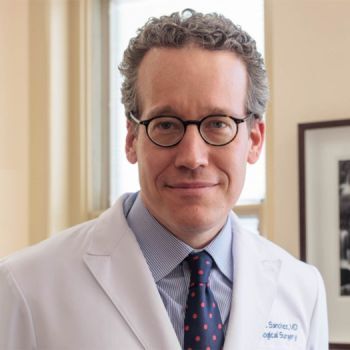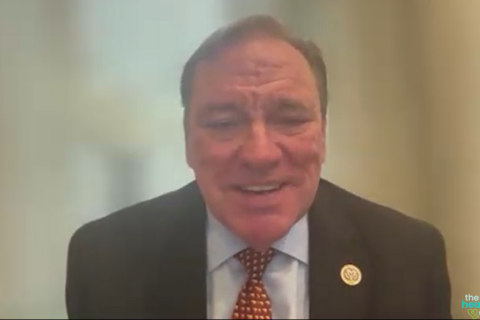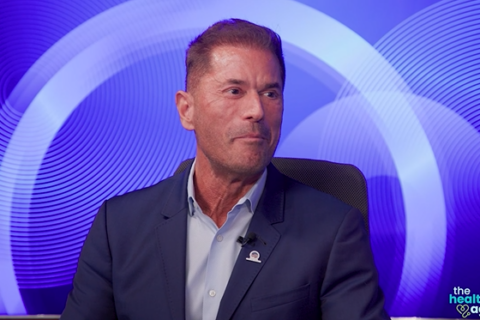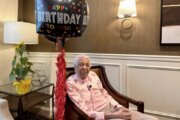This content is provided by GW Hospital.
 Carlos Sanchez, MD, is one of only about 300 board-certified pediatric neurosurgeons in the U.S. He joined GW Hospital in 2021 after practicing at Children’s National Hospital, and he also co-leads a translational research team in brain tumor immunotherapy.
Carlos Sanchez, MD, is one of only about 300 board-certified pediatric neurosurgeons in the U.S. He joined GW Hospital in 2021 after practicing at Children’s National Hospital, and he also co-leads a translational research team in brain tumor immunotherapy.
At GW Hospital’s Neurosciences Institute, he specializes in transitional neurosurgery, caring for adults who became neurosurgical patients in childhood. His focus is on brain tumors and CSF (cerebrospinal fluid) disorders that involve problems with the flow or pressure of the fluid that surrounds the brain and spinal cord.
Q: You have a unique background. Can you start by sharing your personal philosophy of care and what drives you as a neurosurgeon?
A: My guiding philosophy is to treat every patient as if they were family. I believe in caring for the whole person, not just their neurological condition.
With my pediatric neurosurgery training, I’m used to working closely with patients and their families. Building trust and long-term relationships is crucial to good outcomes. I also have a dual role as a clinician and a scientist, meaning I look for ways to bring new solutions from the lab to the bedside. My research focus is developing cell-based immunotherapies for brain tumors. I’m driven by the hope that our innovations in the lab can directly benefit the patients I operate on.
What really drives me is knowing my specific experience and collaboration with colleagues at GW Hospital can help very specific patient groups that might not find specialized care elsewhere. I feel a responsibility to use that expertise to give patients the best care possible, with compassion and humility.
Q: It sounds like a very specialized niche. Are there many surgeons who focus on transitional neurosurgery?
A: Transitional neurosurgery is fairly new and unique. Most pediatric neurosurgeons exclusively stay in children’s hospitals. There’s a growing recognition of the need for transitional neurosurgery programs.
For adult patients with pediatric-onset conditions, it can be challenging to find the right specialist. Many times, adult neurosurgeons without pediatric backgrounds might feel less comfortable with certain cases. That’s why I came to GW Hospital. I saw an opportunity to provide care not many places offer. We have the support of an academic medical center to build a program around these patients.
Q: How do you approach care for adult patients who have had a condition since childhood?
A: The relationship aspect is hugely important. Many patients and their families have been through so much over the years. I always start by listening. I want to hear their full story; what surgeries they had, what worked, what didn’t and their current personal goals. Often, their parents or caregivers are still very involved, so I make it a point to include the family in discussions, with the patient’s permission.
In pediatrics, you learn to communicate with both the patient and guardian. I carry that forward by ensuring everyone is on the same page. Earning trust is key – these patients may have seen many providers over the years. I review all old records, imaging and reach out to previous doctors to fully understand their history.
Q: Can you talk about the team approach at GW Hospital?
A: One thing I value at GW Hospital is our collaborative, multidisciplinary approach. It’s not just me working in isolation. We bring in the appropriate specialists to provide comprehensive care. What makes GW Hospital different is we have sub-specialists under one roof working as a unified team. We have advanced imaging to help diagnose conditions accurately, and the combined expertise of neurosurgeons, neurologists, ophthalmologists, ENT surgeons and others involved in patient care plans.
Collaboratively, we aim to offer treatment options that are leading-edge and tailored to the individual’s needs. We’re proud that at GW Hospital, we offer many therapies — from minimally invasive fixes to complex surgeries — that patients might otherwise have to visit multiple different centers to find.
Q: Why might a patient choose GW Hospital and Dr. Carlos Sanchez for neurosurgery?
A: That’s an important question and I want to answer it respectfully. First, there are many excellent neurosurgeons and centers. I think what sets GW Hospital apart and why I’m proud to be here, is the combination of specialized expertise, leading-edge technology and a personalized touch.
Not every hospital has intraoperative MRI technology or offers laser ablation. Not every neurosurgeon has a background in both pediatric and adult neurosurgery, or is working on immunotherapy research. At GW Hospital, the faculty is innovating and changing the very fabric of neurosurgery today. As an academic center, we’re also training the next generation of neurosurgeons, which means we hold ourselves to very high standards of evidence-based practice and continuous learning.
We really strive to treat patients like family. I know every hospital says that but having worked in different systems, I can tell you we have something special here. We’re large enough to offer world-class care, but small enough to remember your name and story. Patients often say they feel truly cared for as individuals here.
I’d say patients should choose the place that feels right to them. GW Hospital offers an exceptional blend of technical skill, advanced treatments and compassionate care that I believe is hard to match.
Let the GW Hospital family care for you and yours.
To find a doctor, call 888-4GW-DOCS (449-3627) or visit doctors.gwhospital.com
Learn more about the Neurosciences Institute at gwhospital.com/neuro
Physicians are independent practitioners who are not employees or agents of The George Washington University Hospital. The hospital shall not be liable for actions or treatments provided by physicians. For language assistance, disability accommodations and the nondiscrimination notice, visit our website.







